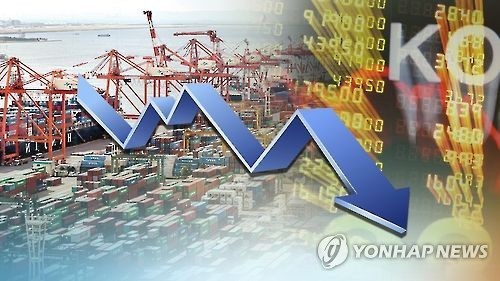Korean economy faces 0.5% fall in presidential election years
By 임정요Published : Dec. 4, 2016 - 13:55
The South Korean economy has experienced a drop in its growth in six previous presidential election years due to rising political uncertainties, a report said Sunday.
The country's economic growth fell an average 0.5 percent point from a year earlier in each election year from 1987 to 2012, according to the report released by Hyundai Research Institute (HRI).

Private consumption and facility investment also declined 0.6 percentage point on-year and 4 percentage points on average, respectively, in the year when presidential elections took place.
South Korea holds presidential elections every five years and the next one is scheduled in 2017.
The HRI report noted that the election stirred up political uncertainties which had a negative impact on the real economy.
It also said low public support for the incumbent government has dragged down the consumer sentiment index (CSI) and the business survey index (BSI) by 2.9 points and 2 points, respectively.
"It is necessary to prevent the recent political uncertainties from spreading to the economy," the HRI said in its latest report.
"The government and public agencies should prepare thoroughly for a government transition."
The high-profile political scandal involving President Park Geun-hye and her close confidante Choi Soon-sil is intensifying the possibility of an early presidential election next year, further fueling political risks to the economy.
Also, a political standoff between the ruling Saenuri Party and opposition parties can cause a leadership vacuum in the economic policymaking line in the government.
Financial Services Commission Chairman Yim Jong-yong has been named the next finance minister, replacing incumbent Yoo, but his appointment was rejected by opposition parties.
Critics are concerned that the virtual absence of the country's top policymakers make it difficult for Asia's fourth-largest economy to cope with strong headwinds like the surprise victory of Donald Trump in the US presidential election and a possible US rate hike. (Yonhap)


![[Exclusive] Korean military set to ban iPhones over 'security' concerns](http://res.heraldm.com/phpwas/restmb_idxmake.php?idx=644&simg=/content/image/2024/04/23/20240423050599_0.jpg&u=20240423183955)
![[AtoZ into Korean mind] Humor in Korea: Navigating the line between what's funny and not](http://res.heraldm.com/phpwas/restmb_idxmake.php?idx=644&simg=/content/image/2024/04/22/20240422050642_0.jpg&u=)



![[Graphic News] 77% of young Koreans still financially dependent](http://res.heraldm.com/phpwas/restmb_idxmake.php?idx=644&simg=/content/image/2024/04/22/20240422050762_0.gif&u=)
![[Herald Interview] Why Toss invited hackers to penetrate its system](http://res.heraldm.com/phpwas/restmb_idxmake.php?idx=644&simg=/content/image/2024/04/22/20240422050569_0.jpg&u=20240422150649)





![[Exclusive] Korean military to ban iPhones over security issues](http://res.heraldm.com/phpwas/restmb_idxmake.php?idx=652&simg=/content/image/2024/04/23/20240423050599_0.jpg&u=20240423183955)



![[Today’s K-pop] Ateez confirms US tour details](http://res.heraldm.com/phpwas/restmb_idxmake.php?idx=642&simg=/content/image/2024/04/23/20240423050700_0.jpg&u=)